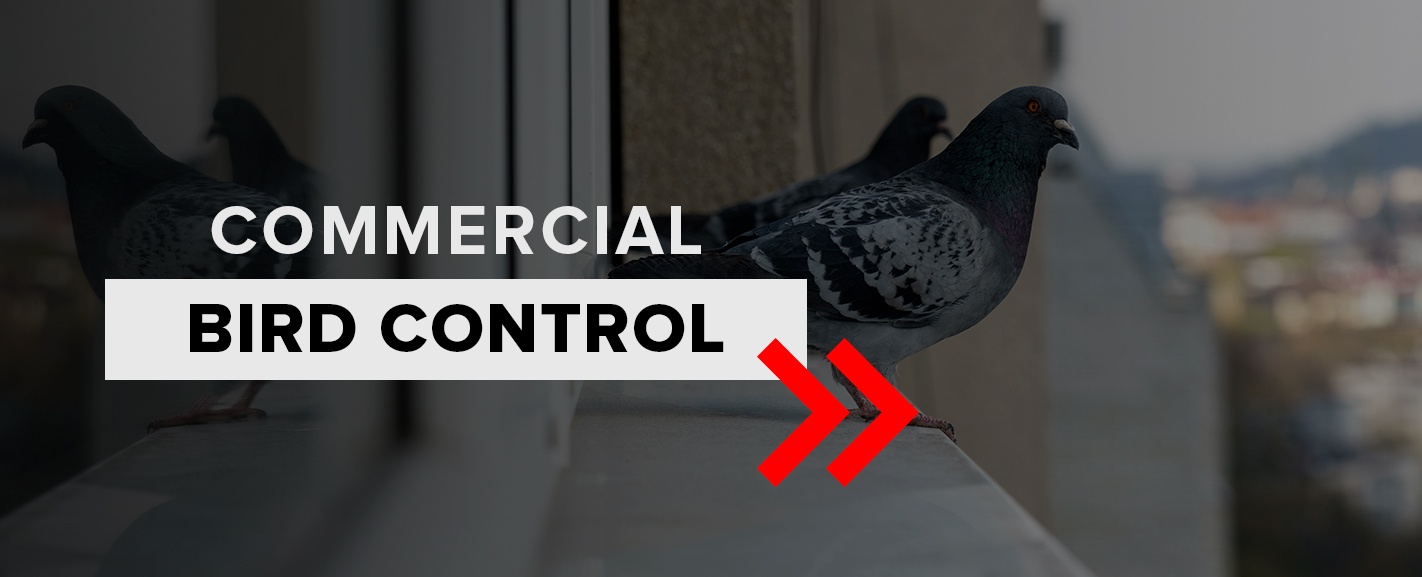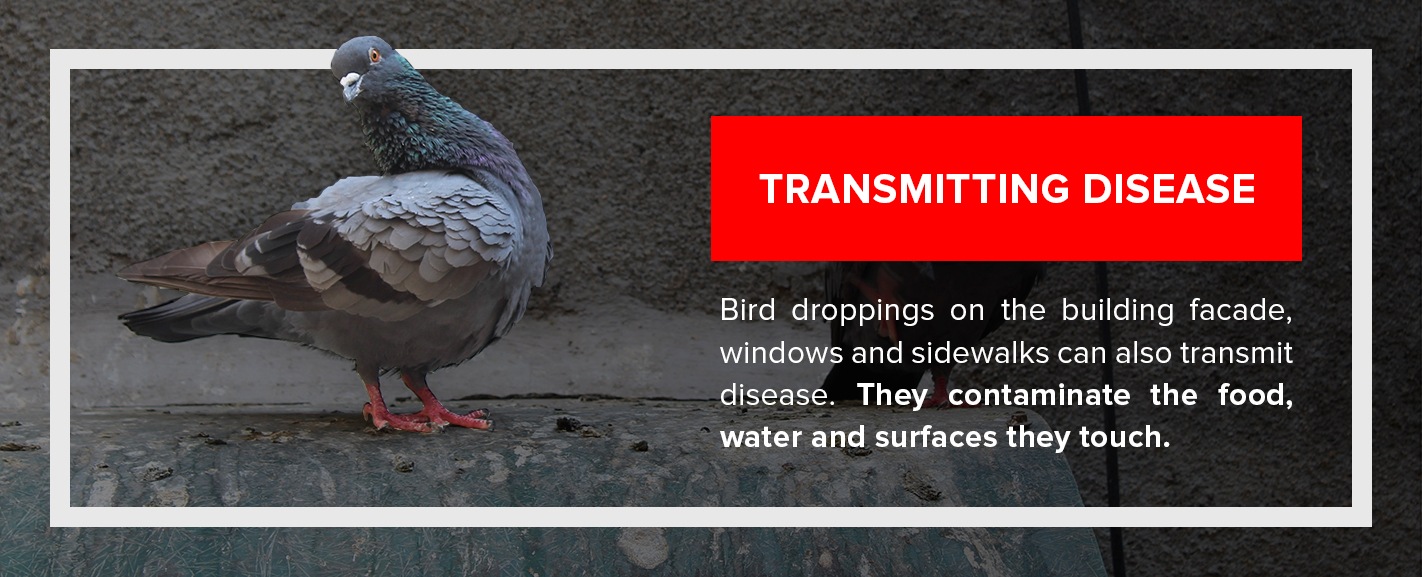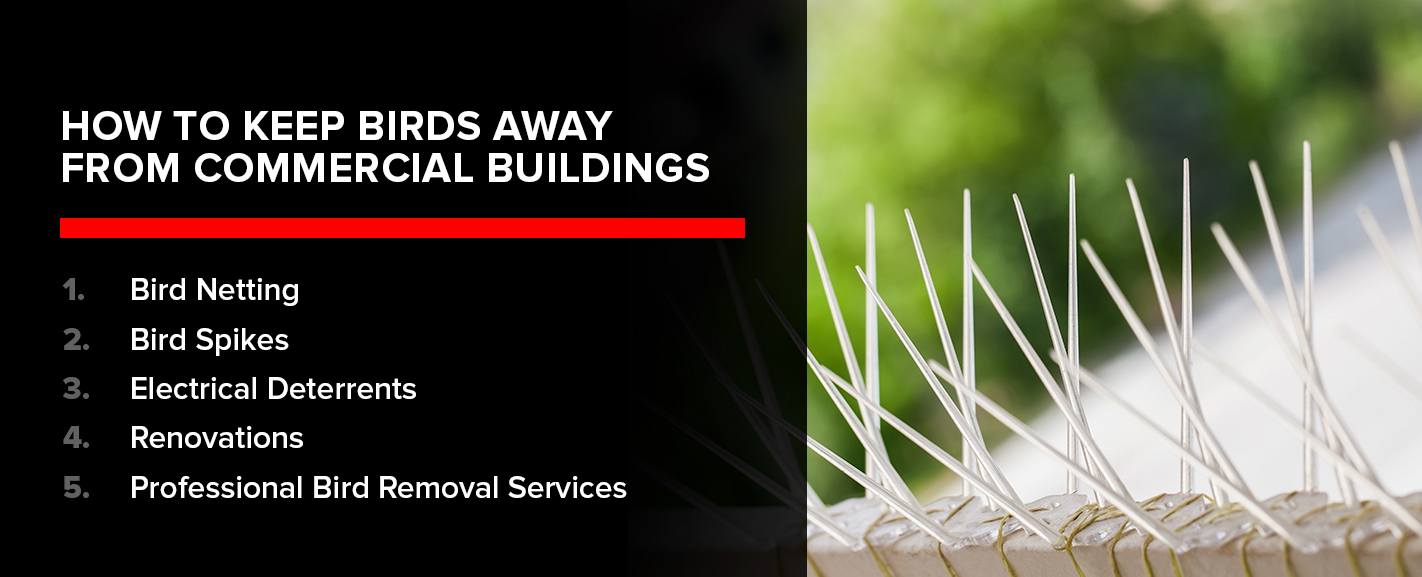
Birds are great fun to look for in the woods or listen to in your garden, but when flocks of birds show up at your commercial business, you probably have a problem on your hands.
Fortunately, bird prevention services can help. In this guide, we discuss why pest birds are so harmful to businesses and provide you with a few options for how to keep birds away from your commercial building.
Generally, people consider birds pests if the birds interfere with human activities. A few pesky species — pigeons, sparrows, starlings and seagulls — most often pose problems for commercial buildings by interfering with the buildings' operations.
Species like sparrows, starlings and pigeons are also often considered pests because they are non-native and do not receive protection under the Federal Migratory Species Act the way many other birds do.
The behavior of these birds often has a detrimental effect on businesses. Sparrows and starlings build nests in inconvenient and even dangerous places, gulls may try to steal food, and all four types of birds can pose risks to human health, such as respitory disease, because of the parasites they harbor and the droppings they leave, as we'll discuss in more detail below.
Bird infestations can harm your business in a few different ways:
Birds can damage buildings if they roost on the buildings with their claws or peck at the buildings with their beaks, as seagulls sometimes do. Bird droppings are also highly caustic. Left untreated, they can eat through roofing and degrade building materials like stone, marble and metal. They compromise your building's structural integrity and necessitate costly repairs.
Streaks of bird droppings on the ground, on outdoor seating areas or along the sides of buildings are unsightly. They may give customers the impression that the business is not well cared for.

Bird droppings on the building facade, windows and sidewalks can also pose health hazards through the transmission of disease. They contaminate the food, water and surfaces they touch, creating health risks for both your employees and customers. Birds and their droppings can carry over 60 types of diseases, including these:
Pest birds can also be detrimental to human health because of the more than 50 types of ectoparasites they harbor — that is, parasites that live outside their host. Birds are likely to have fleas, mites, ticks, lice and even bedbugs that can bite and transmit disease. Pigeon nests often contain yellow mealworms, which also feed on grain and can sometimes end up in cereal products, where they cause gastrointestinal infections when people consume them.
If sparrows or starlings build their nests in your building's pipes or gutters, they can block water drainage. The flooding they can cause can lead to extensive damage and expensive repair work.
Birds like sparrows and starlings also frequently build their nests in electrical machinery. When this happens, the wiring may short-circuit and cause a fire, killing the birds, damaging the building and putting employees' and customers' lives at risk.
Birds like seagulls can also become pests when they interfere with your customers. If you own a restaurant, for instance, and find you need to post signs outdoors warning patrons not to leave their food unattended or customers experience aggressive gull or pigeon encroachment as they try to relax with their meals, you almost certainly have a bird pest problem.

To protect your building and keep its occupants healthy, you should take immediate action if your business has a bird infestation. To keep nuisance birds away from your premises, you can try a few different safe, practical and humane bird control solutions:
Bird netting is precisely what it sounds like — a large piece of mesh you can install to keep birds away from your building. It acts like a barrier to keep birds out while still allowing your business the visibility it needs to flourish.
Bird netting is easy to install and maintain. It's a humane solution — the soft netting won't hurt the birds if they fly into it. And when you choose commercial bird netting installation, you can typically select from different color and material options to get a fixture that blends well with your building's tone and style.
This bird control method typically consists of a few rows of spikes pointing upward at different angles to prevent birds from landing. You can add spikes in many different areas — windowsills, rooftops, porches or near electrical equipment. They work well because they teach birds that your building is not a comfortable or safe place to call home. The spikes don't hurt the birds, but they are uncomfortable and awkward to land on, and most birds will quickly seek out a more hospitable option.
Bird spikes and netting are often businesses' first choices for bird control because they are effective for the building and noninvasive to the birds. But if spikes and netting haven't worked, companies may want to invest in electrical deterrents instead.
Bird control wires are easy to install, and they're discreet — many customers won't even notice them. They work by emitting small electric shocks to encourage the birds to fly elsewhere. They tend to work best on long, flat surfaces rather than complex architectural features, and they are also more effective for pigeon control and other large bird problems, since smaller birds may merely slip around them.
Especially if your building needs improvements anyway, you can also consider a bird-proofing renovation. As you do repairs, you can add sloped, permanent architectural elements that make it more challenging for birds to land and perch on your building.
If your bird infestation is extremely well entrenched, you may need to call in the services of a bird removal professional before you can invest in deterrents. Contacting a local pest control company or your state's fish and wildlife agency is an excellent place to start for bird removal.
To see the benefits of commercial bird control for your business, partner with PSI. We offer professional installation of deterrents like bird netting, bird spikes and wires, and our extensive industry expertise means we know how to choose the right deterrent for the particular bird species you're dealing with, the severity of the infestation and the type and age of your building. Our practical, humane solutions will give you your inviting, attractive commercial property back while leaving the birds free and healthy.